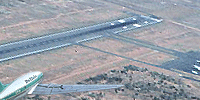 |
 |
|
||||
|
By
Wikipedia,
The Cessna 180 is a four- or six-seat, fixed conventional gear general aviation airplane which was produced between 1953 and 1981. Though the design is no longer in production, many of these aircraft are still in use as personal aircraft and in utility roles such as bush flying. DevelopmentCessna introduced the heavier and more powerful 180 as a complement to the Cessna 170. It eventually came to be known as the Skywagon, a name first applied only to the more-powerful 185. The prototype Cessna 180, N41697, first flew on May 26, 1952. Cessna engineering test pilot William D. Thompson was at the controls. In all its versions, 6,193 Cessna 180s were manufactured. In 1956, a tricycle gear version of this design was introduced as the Cessna 182, which came to bear the name Skylane. Additionally, in 1960, Cessna introduced a heavier, more powerful sibling to the 180, the conventional gear Cessna 185. For a time, all three versions of the design were in production. DesignThe airframe of the 180 is all metal, constructed of aluminum alloy. The fuselage is a semi-monocoque structure, with exterior skin sheets riveted to formers and longerons. The strut-braced wings, likewise, are constructed of exterior skin sheets riveted to spars and ribs. The landing gear of the 180 is in a conventional arrangement, with main gear legs made of spring steel, and a steerable tailwheel mounted on a hollow tapered steel tube. The Continental O-470-A of 225 horsepower (168 kW) was installed in the 1953 model, which uniquely has no baggage door. The Continental O-470-J, also of 225 horsepower (168 kW), replaced the -A model in 1954 and 1955, and was succeeded by the 230 horsepower (170 kW) O-470-K from 1956 through 1961, by the O-470-R from 1962 through 1972, by the O-470-S from 1973 through 1976, and by the O-470-U from 1977 through the end of production. Cessna 180s produced between 1953 and 1963 have two side windows, while 1964 to 1981 models feature three side windows, as they feature the same fuselage as the Cessna 185. Some late production 1962 Cessna 180s were also known to have the three windows as well. 180s can be put on floats if they are equipped with factory-installed float kits, which are essentially reinforcing members installed at high-stress points of the fuselage. Operational history
The 180 is considered a workhorse of an airplane, and is favored to this day as a bush plane by many who fly to and from remote, unimproved airstrips in places such as Alaska and distant parts of Canada, the Pacific Islands, and Africa. The 180 is the preferred aircraft of the Colorado Division of Wildlife for monitoring wildlife and re-stocking fish in remote mountain lakes; it is also used by the Montana Department of Natural Resources and Conservation. The New Mexico State Police Aircraft Division was created after it acquired its first aircraft, a fixed wing Cessna 180, on loan from the State Corporation Commission. The Canadian airlines Lamb Air and Norcanair operated several 180s. A number of 180s continue in similar roles at Kenmore Air in Washington, Alaska Seaplane Service, and Brazil's Lider Taxi Aereo. Record flightThe Cessna 180 gained recognition as the aircraft chosen by Geraldine Mock, the first woman pilot to successfully fly around the world. The flight was made in 1964 in her 1953 model, the Spirit of Columbus (N1538C), as chronicled in her book Three-Eight Charlie. The Cessna factory obtained the aircraft and kept it at the Pawnee (Wichita, Kansas) manufacturing plant after the epic flight, suspended from the ceiling over one of the manufacturing lines. It is currently on display at the National Air and Space Museum. Aircraft Type ClubThe Cessna 180 is supported by an active aircraft type club, The Cessna Pilots Association. OperatorsMilitary operators19 Cessna 180s were in service with both the Australian Army and RAAF from 1959 to 1974.
Civil Operators
Specifications (180)General characteristics
Performance
See alsoRelated development External links
Text from Wikipedia is available under the Creative Commons Attribution/Share-Alike License; additional terms may apply.
Published in July 2009. Click here to read more articles related to aviation and space!
|
||||||||||||||||||||||||||||||||||||||||||||||||||||

 |
|
Copyright 2004-2025 © by Airports-Worldwide.com, Vyshenskoho st. 36, Lviv 79010, Ukraine Legal Disclaimer |